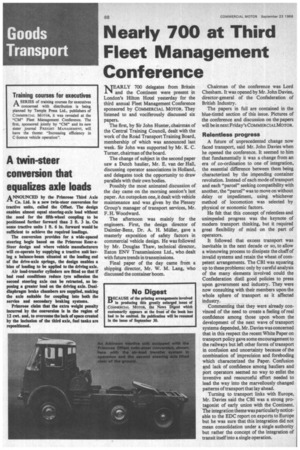Nearly 700 at Third Fleet Management Conference
Page 70

If you've noticed an error in this article please click here to report it so we can fix it.
NEARLY 700 delegates from Britain fr Nand the Continent were present in London's Hilton Hotel yesterday for the third annual Fleet Management Conference sponsored by COMMERCIAL MOTOR. They listened to and vociferously discussed six papers.
The first, by Sir John Hunter, chairman of the Central Training Council, dealt with the work of the Road Transport Training Board, membership of which was announced last week. Sir John was supported by Mr. K. C. Turner, chairman of the board.
The change of subject in the second paper saw a Dutch haulier, Mr. E. van der Hall, discussing operator associations in Holland, and delegates took the opportunity to draw parallels with their own bodies.
Possibly the most animated discussion of the day came on the morning session's last paper. An outspoken one, it dealt with vehicle maintenance and was given by the Plessey Group's manager of transport services, Mr. F. H. Woodward.
The afternoon was mainly for the engineers. First, the design director of Daimler-Benz, Dr. A. H. Muller, gave a masterly exposition of safety factors in commercial vehicle design. He was followed by Mr. Douglas Thaw, technical director, Eaton ENV Transmissions Ltd., who dealt with future trends in transmissions.
Final paper of the day came from a shipping director, Mr. W. M. Lang, who discussed the container boom. Chairman of the conference was Lord Chesham. It was opened by Mr. John Davies, director-general of the Confederation of British Industry.
The papers in full are contained in the blue-tinted section of this issue. Pictures of the conference and discussion on the papers will be in next Friday's COMIvIERciALMoToR.
Relentless progress
A future of unprecedented change now faced transport, said Mr. John Davies when he opened the conference. It seemed to him that fundamentally it was a change from an era of co-ordination to one of integration, the essential difference between them being characterized by the impending container revolution. Instead of each mode oftransport and each "parcel" seeking compatibility with another, the "parcel" was to move on without delay or impediment, using whichever method of locomotion was selected by physical or economic factors.
He felt that this concept of relentless and unimpeded progress was the keynote of modern transport thinking, but it required great flexibility of mind on the part of operators.
It followed that excess transport was inevitable in the next decade or so, to allow a winnowing process to dissipate the chaff of invalid systems and retain the wheat of competent arrangements. The CBI was squaring up to these problems: only by careful analysis of the many elements involved could the Confederation distil good policies to press upon government and industry. They were now consulting with their members upon the whole sphere of transport as it affected industry.
Commenting that they were already convinced of the need to create a feeling of real confidence among those upon whom the development of the next wave of transport systems depended, Mr. Davies was concerned that in this respect the recent White Paper on transport policy gave some encouragement to the railways but left other forms of transport in confusion and uncertainty because of the combination of imprecision and foreboding which characterized the Paper. Confusion and lack of confidence among hauliers and port operators seemed no way to enlist the inventive and resourceful effort needed to lead the way into the marvellously changed patterns of transport that lay ahead.
Turning to transport links with Europe, Mr. Davies said the CBI was a strong protagonist of early union with the Continent. The integration theme was particularly noticeable to the EDC report on exports to Europe but he was sure that this integration did not mean consolidation under a single authority but rather the concept of the integration of transit itself into a single operation.








































































































































































































































































































































































